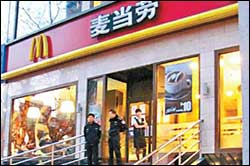 Shanghai will introduce tough new laws to blacklist firms that flout food safety rules - a significant move in the mainland's consumer hub to try to put a stop to practices that in recent years have killed children and caused much illness.
Shanghai will introduce tough new laws to blacklist firms that flout food safety rules - a significant move in the mainland's consumer hub to try to put a stop to practices that in recent years have killed children and caused much illness.The action follows on from claims that mainland outlets of fast food chains McDonald's, KFC and Yoshinoya used poultry from commercial producer Liuhe Group, which has been embroiled in a scandal of antiviral drugs and growth hormones going into chickens right up to them going for slaughter.
An investigation by Shanghai food safety authorities came up with a finding that KFC parent Yum Brands covered up the fact that some of its chicken products had failed to meet safety benchmarks.
Over the past two years, it was also claimed, Yum Brands did not go public with findings on eight batches of poultry products from Liuhe.
They were said to have been tested and found to contain excessive amounts of antibiotics. Some of the poultry went to outlets outside Shanghai, a food safety official in the city told mainland media.
And McDonald's China agreed yesterday that Liuhe Group was one of its suppliers of poultry products.
But a spokeswoman for the chain said it had stopped all supplies from Shandong Liuhe Group since December 18.
The action was said to be in line with a "continuous process in ensuring food safety and quality system expectations" that apply globally.
She also said that all products arriving in Hong Kong had gone
through tests by government departments.
"McDonald's supplier management processes are very stringent," she added, saying they follow "the highest standards that comply with local regulations."
Also in Hong Kong, Yoshinoya executives said chicken products were imported from various countries, including China. But the chain did not import poultry products from Liuhe Group.
And word from KFC was that no chicken products sold in Hong Kong were sourced from the mainland, and again there was stress on the fact that local food safety standards were met.
Back in Shanghai, attention is on the proposal that firms caught using banned substances in food, producing food from inedible ingredients, or making, selling or using banned food additives will be banned from operating in the city.
The planned regulation and blacklisting can be expected to take effect next year, Xinhua News Agency quoted Gu Zhenhua, deputy director of Shanghai's municipal food safety committee, as saying.
China's food safety record is abysmal. There are frequent reports of outrages such as cooking oil being recovered from drains and recycled, as well as cancer-causing agents in milk.
In 2008, milk laced with the industrial chemical melamine killed at least six children and sickened nearly 300,000.





